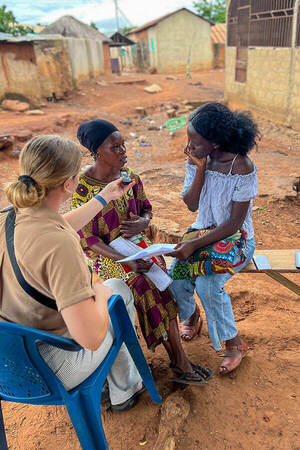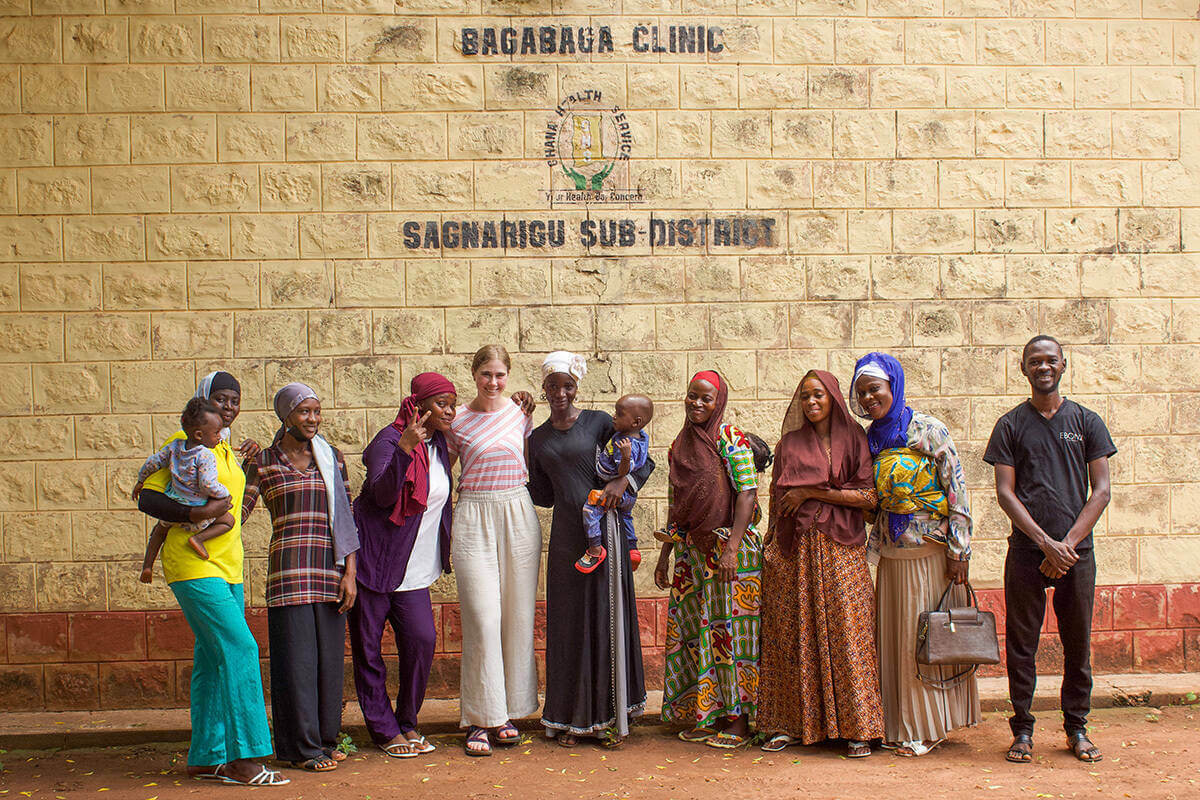Notre Dame student researcher identifies a mix of factors behind decline in exclusive breastfeeding in Ghana
Studies have shown that breastfeeding reduces the risk of asthma, obesity, and type 1 diabetes. It can also reduce the risk of Sudden Infant Death Syndrome by up to 64% and overall infant death risks by as much as 40%. So it is good news that, globally, exclusive breastfeeding is on the rise, having increased from 38% to 48% over the last decade.
However, during the same period, Ghana saw a significant decline in breastfeeding, from 63% to 43%, and the trend has researchers at the University of Notre Dame concerned.
“It’s a puzzle that I wanted to work towards piecing together,” says Sarah Frick.

with mothers for capstone research in Ghana.
A student in the Master of Science in Global Health (MSGH) program at the University of Notre Dame, Frick worked with her advisor, Yenupini Joyce Adams of the Eck Institute for Global Health, to develop a capstone research project aimed at collecting key information from Ghanaian mothers in the Sagnarigu Municipal region where breastfeeding trends have decreased the most. Dr. Adams, an assistant professor and global maternal research lead, conducts extensive research to address maternal health disparities and to improve maternal and postpartum care outcomes.
Before the MSGH program, Frick received a Bachelor of Science in Nursing from Saint Mary’s College which served as the foundation for her current research interests. “I like caring for people, so I began looking for ways to translate my skills in nursing into a global setting,” she explains.
Frick’s MSGH research project started during the summer of 2023, where she recorded group discussions and interviews with Ghanaian mothers of similar socio-economic status. Mothers were asked to share their personal experiences with breastfeeding and to offer perspectives on how breastfeeding is perceived within their community.
After the interviews were transcribed and translated into English, Frick analyzed them to identify the barriers that may have caused a reduction in exclusive breastfeeding.
“What we found was that the decrease in breastfeeding among women in the Sagnarigu Municipal of Ghana is a result of several factors: mothers feel that they are not receiving education from midwives to help make informed decisions, mothers believe they cannot or do not have enough breastmilk for their child, and pressure from their families is influencing them to provide for their babies in other ways,” says Frick.
Many of the mothers interviewed by Frick described how food instability has influenced how they care for their young children. A limited food supply can cause milk production to decrease significantly for mothers, forcing them to seek alternative options. “Sometimes, when a family does not have enough money to afford a healthy variety of foods, the mother might prioritize her family over herself,” Frick explains. “If the husband has to work each day, he needs to eat food to have energy to work. If there are other children in the household, they need to eat first. There might not be a lot of food left for the mother.”
Frick hopes that insights from her project can be shared with in-country partners, policy-makers, and midwives to develop strategies to improve maternal and postpartum health. “Midwives could play a huge role in improving breastfeeding practices,” she says. “Even though it is just one piece of a very complex puzzle, midwives are the advocates that can educate mothers and their families about the benefits of exclusive breastfeeding. They can empower not just mothers, but also their families to make informed decisions about what is best for their baby.”

Adams, who grew up in Ghana before pursuing her professional career in the United States, is confident about the impact Frick’s research will have. “Many Ghanaian mothers have been influenced by complicated factors (culture, family influence, inadequate education, among others) that have molded their views on exclusive breastfeeding,” she says. “Sarah’s work will help to guide an increased focus on providing mothers with the resources that may help them to have more success with exclusive breastfeeding.”
Frick will graduate from the MSGH program in May, 2024.
Maternal health research is ongoing at the Eck Institute for Global Health. “The Master of Science in Global Health program is inspiring students, like Sarah, to use interdisciplinary methods to understand the challenges faced by mothers and their young children,” says Dr. Bernard Nahlen, director of the Eck Institute for Global Health and professor of biological sciences. “We welcome students and faculty from across campus who are interested in maternal, newborn, and child health research to work with us to tackle these critical health challenges.”
To learn more about maternal, newborn, and child health research, please visit the Eck Institute for Global Health website. To learn more about the masters in global health program, including how to apply, please visit https://globalhealth.nd.edu/education-training/masters/.
Contact:
Christine Grashorn, Communications Specialist
Notre Dame Research / University of Notre Dame
cgrashor@nd.edu / 574.631.4856
research.nd.edu / @UNDResearch
About the Eck Institute for Global Health
The Eck Institute for Global Health (EIGH), an integral part of Notre Dame Research, builds on the University’s historical strength in infectious disease research, including vector-borne diseases, while broadening the interdisciplinary expertise into other key global health areas including maternal, newborn, and child health (MNCH); community health; mental health; nutrition and non-communicable diseases; the environment and health; health analytics and technologies; and health systems and organizations. Our team of interdisciplinary researchers and their students holistically address health disparities around the world. EIGH faculty affiliates recognize health as a fundamental human right and promote research, training, and service to advance health standards for all people, especially those in resource-poor countries who are disproportionately impacted by preventable diseases. The EIGH is training the next generation of global health researchers and leaders through undergraduate, Master of Science in Global Health, doctoral, and postdoctoral programs.
Originally published by at globalhealth.nd.edu on May 17, 2024.
Latest Research
- University of Notre Dame and IBM Research build tools for AI governanceMain Building (Photo by Matt Cashore/University of Notre Dame) …
- Smarter tools for policymakers: Notre Dame researchers target urban carbon emissions, building by buildingCarbon emissions continue to increase at record levels, fueling climate instability and worsening air quality conditions for billions in cities worldwide. Yet despite global commitments to carbon neutrality, urban policymakers still struggle to implement effective mitigation strategies at the city scale. Now, researchers at Notre Dame’s School of Architecture, the College of Engineering and the Lucy Family Institute for Data & Society are working to reduce carbon emissions through advanced simulations and a novel artificial intelligence-driven tool, EcoSphere.
- Seven engineering faculty named collegiate professorsSeven faculty members in the Notre Dame College of Engineering have been named collegiate professors—a prestigious title awarded by the university and college in recognition of excellence in research, teaching and service. The designation may be conferred on faculty at the assistant, associate or…
- ‘A special challenge’: German studies scholar wins National Humanities Center fellowship for research on medieval womenFor CJ Jones, the joy of research is not the answers but the journey. And the next step on that journey is a fellowship with the National Humanities Center. …
- Notre Dame Lead Innovation Team partners with local WIC program to identify, prevent lead poisoning in childrenB.A.B.E. store “shoppers” now have something new to help their families: free lead screening kits offered by the University of Notre Dame’s Lead Innovation Team.
- Notre Dame Welcomes Ninth Cohort of Warrior-Scholars for Transformative Academic JourneyNOTRE DAME, IN – The University of Notre Dame recently concluded its ninth successful Warrior-Scholar Project (WSP) boot camp, hosting 34 dedicated Warrior-Scholars from June 21st to 28th. This intensive, week-long academic residency provided transitioning service members and veterans…













